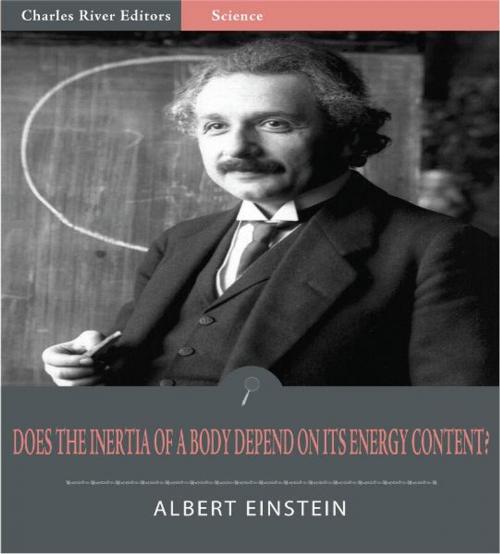Does the Inertia of a Body Depend on its Energy Content? (Illustrated Edition)
Nonfiction, Science & Nature, Science, Physics, Astrophysics & Space Science, Other Sciences, History| Author: | Albert Einstein | ISBN: | 9781619824676 |
| Publisher: | Charles River Editors | Publication: | January 30, 2012 |
| Imprint: | Language: | English |
| Author: | Albert Einstein |
| ISBN: | 9781619824676 |
| Publisher: | Charles River Editors |
| Publication: | January 30, 2012 |
| Imprint: | |
| Language: | English |
Albert Einstein (1879-1955) needs no formal introduction, as he is known around the world as one of historys most brilliant geniuses and one of its most influential scientists. Einstein is often regarded as the father of modern physics and received the 1921 Nobel Prize in Physics "for his services to theoretical physics, and especially for his discovery of the law of the photoelectric effect". Einstein published more than 300 scientific papers along with over 150 non-scientific works. His great intelligence and originality have made the word "Einstein" synonymous with genius. Einsteins greatest and most famous theory is the theory of relativity, which fundamentally changed the understanding of physics and astronomy during the 20th century. When first published, relativity superseded a 200-year-old theory of mechanics put forth by Isaac Newton. The theory of relativity overturned the concept of motion from Newton's day, into all motion is relative. Time was no longer uniform and absolute. Therefore, no longer could physics be understood as space by itself, and time by itself. Instead, an added dimension had to be taken into account with curved spacetime. Time now depended on velocity, and contraction became a fundamental consequence at appropriate speeds. In the field of physics, relativity catalyzed and added an essential depth of knowledge to the science of elementary particles and their fundamental interactions, along with ushering in the nuclear age. With relativity, cosmology and astrophysics predicted extraordinary astronomical phenomena such as neutron stars, black holes, and gravitational waves. This edition of Einsteins short essay Does the Inertia of a Body Depend on its Energy Content is specially formatted with a Table of Contents and is illustrated with pictures of the great thinker.
Albert Einstein (1879-1955) needs no formal introduction, as he is known around the world as one of historys most brilliant geniuses and one of its most influential scientists. Einstein is often regarded as the father of modern physics and received the 1921 Nobel Prize in Physics "for his services to theoretical physics, and especially for his discovery of the law of the photoelectric effect". Einstein published more than 300 scientific papers along with over 150 non-scientific works. His great intelligence and originality have made the word "Einstein" synonymous with genius. Einsteins greatest and most famous theory is the theory of relativity, which fundamentally changed the understanding of physics and astronomy during the 20th century. When first published, relativity superseded a 200-year-old theory of mechanics put forth by Isaac Newton. The theory of relativity overturned the concept of motion from Newton's day, into all motion is relative. Time was no longer uniform and absolute. Therefore, no longer could physics be understood as space by itself, and time by itself. Instead, an added dimension had to be taken into account with curved spacetime. Time now depended on velocity, and contraction became a fundamental consequence at appropriate speeds. In the field of physics, relativity catalyzed and added an essential depth of knowledge to the science of elementary particles and their fundamental interactions, along with ushering in the nuclear age. With relativity, cosmology and astrophysics predicted extraordinary astronomical phenomena such as neutron stars, black holes, and gravitational waves. This edition of Einsteins short essay Does the Inertia of a Body Depend on its Energy Content is specially formatted with a Table of Contents and is illustrated with pictures of the great thinker.















